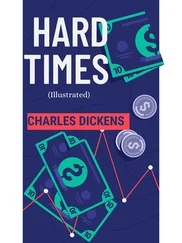‘Let me go my way alone,’ she said in a low voice, ‘and let the hands of no honest man touch mine to-night.’ When she had tottered to the door, she turned, and added with a stronger effort, ‘This is a secret, which, of necessity, I trust to you. You are a true man. As you have ever been good and kind to me,—keep it. If any noise was heard above, make some excuse—say anything but what you really saw, and never let a word or look between us, recall this circumstance. I trust to you. Mind, I trust to you. How much I trust, you never can conceive.’
Casting her eyes upon him for an instant, she withdrew, and left him there alone.
Gabriel, not knowing what to think, stood staring at the door with a countenance full of surprise and dismay. The more he pondered on what had passed, the less able he was to give it any favourable interpretation. To find this widow woman, whose life for so many years had been supposed to be one of solitude and retirement, and who, in her quiet suffering character, had gained the good opinion and respect of all who knew her—to find her linked mysteriously with an ill-omened man, alarmed at his appearance, and yet favouring his escape, was a discovery that pained as much as startled him. Her reliance on his secrecy, and his tacit acquiescence, increased his distress of mind. If he had spoken boldly, persisted in questioning her, detained her when she rose to leave the room, made any kind of protest, instead of silently compromising himself, as he felt he had done, he would have been more at ease.
‘Why did I let her say it was a secret, and she trusted it to me!’ said Gabriel, putting his wig on one side to scratch his head with greater ease, and looking ruefully at the fire. ‘I have no more readiness than old John himself. Why didn’t I say firmly, “You have no right to such secrets, and I demand of you to tell me what this means,” instead of standing gaping at her, like an old moon-calf as I am! But there’s my weakness. I can be obstinate enough with men if need be, but women may twist me round their fingers at their pleasure.’
He took his wig off outright as he made this reflection, and, warming his handkerchief at the fire began to rub and polish his bald head with it, until it glistened again.
‘And yet,’ said the locksmith, softening under this soothing process, and stopping to smile, ‘it MAY be nothing. Any drunken brawler trying to make his way into the house, would have alarmed a quiet soul like her. But then’—and here was the vexation—‘how came it to be that man; how comes he to have this influence over her; how came she to favour his getting away from me; and, more than all, how came she not to say it was a sudden fright, and nothing more? It’s a sad thing to have, in one minute, reason to mistrust a person I have known so long, and an old sweetheart into the bargain; but what else can I do, with all this upon my mind!—Is that Barnaby outside there?’
‘Ay!’ he cried, looking in and nodding. ‘Sure enough it’s Barnaby—how did you guess?’
‘By your shadow,’ said the locksmith.
‘Oho!’ cried Barnaby, glancing over his shoulder, ‘He’s a merry fellow, that shadow, and keeps close to me, though I AM silly. We have such pranks, such walks, such runs, such gambols on the grass! Sometimes he’ll be half as tall as a church steeple, and sometimes no bigger than a dwarf. Now, he goes on before, and now behind, and anon he’ll be stealing on, on this side, or on that, stopping whenever I stop, and thinking I can’t see him, though I have my eye on him sharp enough. Oh! he’s a merry fellow. Tell me—is he silly too? I think he is.’
‘Why?’ asked Gabriel.
‘Because he never tires of mocking me, but does it all day long.—Why don’t you come?’
‘Where?’
‘Upstairs. He wants you. Stay—where’s HIS shadow? Come. You’re a wise man; tell me that.’
‘Beside him, Barnaby; beside him, I suppose,’ returned the locksmith.
‘No!’ he replied, shaking his head. ‘Guess again.’
‘Gone out a walking, maybe?’
‘He has changed shadows with a woman,’ the idiot whispered in his ear, and then fell back with a look of triumph. ‘Her shadow’s always with him, and his with her. That’s sport I think, eh?’
‘Barnaby,’ said the locksmith, with a grave look; ‘come hither, lad.’
‘I know what you want to say. I know!’ he replied, keeping away from him. ‘But I’m cunning, I’m silent. I only say so much to you—are you ready?’ As he spoke, he caught up the light, and waved it with a wild laugh above his head.
‘Softly—gently,’ said the locksmith, exerting all his influence to keep him calm and quiet. ‘I thought you had been asleep.’
‘So I HAVE been asleep,’ he rejoined, with widely-opened eyes. ‘There have been great faces coming and going—close to my face, and then a mile away—low places to creep through, whether I would or no—high churches to fall down from—strange creatures crowded up together neck and heels, to sit upon the bed—that’s sleep, eh?’
‘Dreams, Barnaby, dreams,’ said the locksmith.
‘Dreams!’ he echoed softly, drawing closer to him. ‘Those are not dreams.’
‘What are,’ replied the locksmith, ‘if they are not?’
‘I dreamed,’ said Barnaby, passing his arm through Varden’s, and peering close into his face as he answered in a whisper, ‘I dreamed just now that something—it was in the shape of a man—followed me—came softly after me—wouldn’t let me be—but was always hiding and crouching, like a cat in dark corners, waiting till I should pass; when it crept out and came softly after me.—Did you ever see me run?’
‘Many a time, you know.’
‘You never saw me run as I did in this dream. Still it came creeping on to worry me. Nearer, nearer, nearer—I ran faster—leaped—sprung out of bed, and to the window—and there, in the street below—but he is waiting for us. Are you coming?’
‘What in the street below, Barnaby?’ said Varden, imagining that he traced some connection between this vision and what had actually occurred.
Barnaby looked into his face, muttered incoherently, waved the light above his head again, laughed, and drawing the locksmith’s arm more tightly through his own, led him up the stairs in silence.
They entered a homely bedchamber, garnished in a scanty way with chairs, whose spindle-shanks bespoke their age, and other furniture of very little worth; but clean and neatly kept. Reclining in an easy-chair before the fire, pale and weak from waste of blood, was Edward Chester, the young gentleman who had been the first to quit the Maypole on the previous night, and who, extending his hand to the locksmith, welcomed him as his preserver and friend.
‘Say no more, sir, say no more,’ said Gabriel. ‘I hope I would have done at least as much for any man in such a strait, and most of all for you, sir. A certain young lady,’ he added, with some hesitation, ‘has done us many a kind turn, and we naturally feel—I hope I give you no offence in saying this, sir?’
The young man smiled and shook his head; at the same time moving in his chair as if in pain.
‘It’s no great matter,’ he said, in answer to the locksmith’s sympathising look, ‘a mere uneasiness arising at least as much from being cooped up here, as from the slight wound I have, or from the loss of blood. Be seated, Mr Varden.’
‘If I may make so bold, Mr Edward, as to lean upon your chair,’ returned the locksmith, accommodating his action to his speech, and bending over him, ‘I’ll stand here for the convenience of speaking low. Barnaby is not in his quietest humour to-night, and at such times talking never does him good.’
They both glanced at the subject of this remark, who had taken a seat on the other side of the fire, and, smiling vacantly, was making puzzles on his fingers with a skein of string.
Читать дальше












